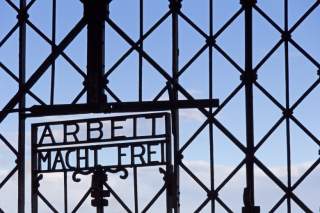Dachau in the First Days of the Holocaust
To the early prisoners of the camps, a straight line to Auschwitz, or something like it, may have been discernible within a few months of Hitler’s assumption to power.
A research fellow at the Hebrew University of Jerusalem, Wünschmann devotes an entire chapter to the experiences of Jewish women in the prewar camps, and occasionally delves into a kind of machismo psychology, virulent among the SS but hardly unknown to the prisoner populations, to explain various behaviors. Thankfully, this approach stops short of the most polarizing features of gender studies and makes for some of this volume’s most enlightening observations. Again, she cites Neurath, who arrived at Dachau in April 1938 and whose memoir provides a veritable taxonomy of the “honorable” and “shameful” reactions a prisoner could exhibit in the face of beatings by camp guards. “If he cries and weeps, he is considered a weakling,” Neurath wrote, adding that the expectations of other prisoners, reflecting their own backgrounds and times, demanded that the stricken should “remain silent and solid, both before, during, and after the beating.”
While the Nazis’ first deportations to the camps focused as much on “political” prisoners as on Jews—brutal roundups of Communists, Bolsheviks, members of the labor movement, and journalists and lawyers who had bravely inveighed against Hitler and the brownshirts—Wünschmann demonstrates authoritatively that the Jews existed at the bottom of the prisoner hierarchy, suffering most acutely as outcasts among outcasts. “From the beginning,” she writes, “Jews in the early concentration camps were exposed to an extreme degree of violence, manifested most strikingly in a stark overrepresentation of Jews among the deaths.”
And yet one of the author’s most perceptive insights is how little the Jewish populations of Dachau, Osthofen, Breitenau, Oranienburg and the other prewar camps felt they had in common with each other—until their arrival at such places, their immediate segregation into “Jew companies” (barracks) and their targeting for abuse. “Here in the camp they distinguish between prisoners and Jews,” observed the Buchenwald inmate Julius Meyer, wryly. “So, we are now officially the Jews.”
IT IS not among the author’s principal aims to weigh in on the great historiographical debate of the last generation of Holocaust studies: the question of what, at bottom, motivated the mostly Christian citizens of Europe’s most culturally and technologically advanced country, at a time of post-Enlightenment modernity, to organize and participate in the innumerable cruelties known as the Holocaust. Wünschmann does cite approvingly the work of Karl Schleunes, whose pioneering 1970 study The Twisted Road to Auschwitz stands as a foundational text for “the functionalists”—that is, those who argue that the Final Solution, commenced in earnest after Germany launched its invasion of the Soviet Union, was not foreordained by the Nazis’ earlier oppression of the Jews, nor even by Hitler’s worldview, but emerged, rather, as the last in a series of policy experiments undertaken in response to external events.
Inadvertently, however, Wünschmann provides support for the other school of thought—“the intentionalists,” exemplified by Daniel Jonah Goldhagen in his controversial 1996 best seller Hitler’s Willing Executioners—when she quotes from an article that Hitler published in March 1921. “Let us stop the Jews from undermining our nation, if necessary by keeping their germs safely in concentration camps,” the future dictator wrote, adding: “In short, clean our nation of all poison above and below.” Only a few years would pass before the publication of Mein Kampf in 1925, in which Hitler lamented how “millions” of German deaths on the front lines of World War I could have been prevented if “twelve or fifteen thousand of these Hebrew corrupters of the people had been held under poison gas.”
To the early inhabitants of the camps, a straight line to Auschwitz, or something like it, may have been discernible within a few months of Hitler’s assumption of power. Kasimir Dittenheber, an inmate at Dachau who heard with his own ears the shots that killed Rudolf Benario, Ernst Goldmann, and Arthur and Erwin Kahn, later wrote that the four had been “defenseless” and “selected” for their fate, even though none had shown any intention of escape. “Now we knew it,” Dittenheber would write, “and we knew that this murder would be followed by others.”
James Rosen is chief Washington correspondent for Fox News and author of The Strong Man: John Mitchell and the Secrets of Watergate (Doubleday, 2008).
Image: Wikimedia Commons/GaryBlakely

